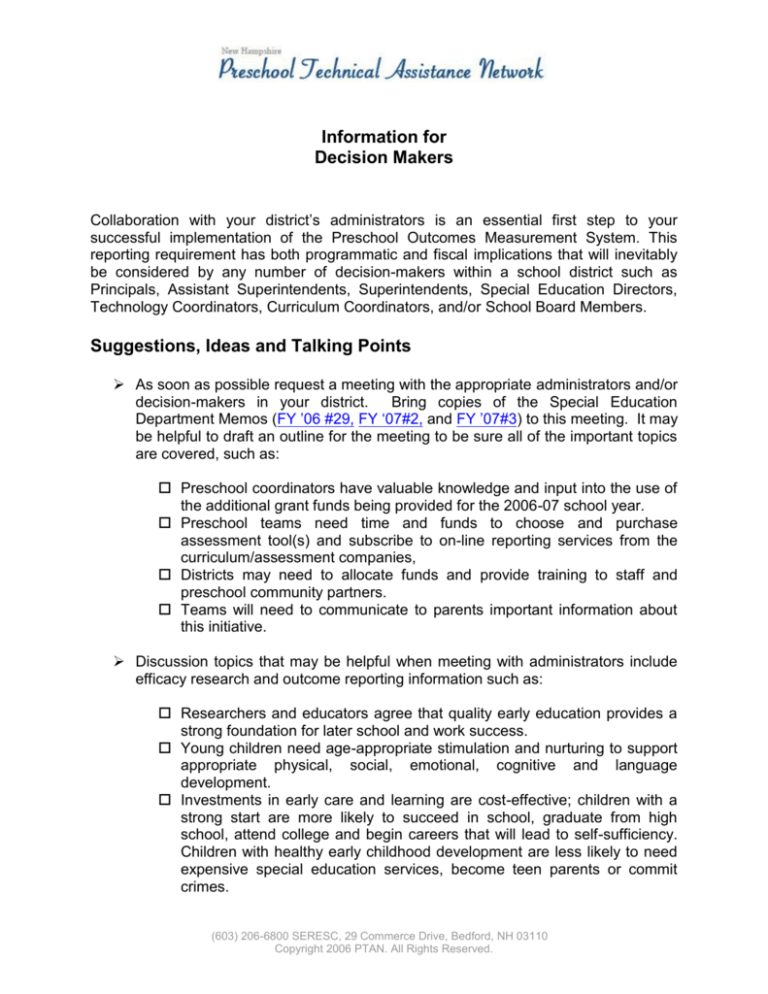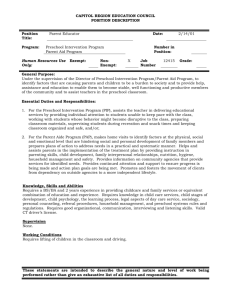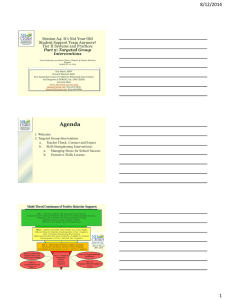
Information for
Decision Makers
Collaboration with your district’s administrators is an essential first step to your
successful implementation of the Preschool Outcomes Measurement System. This
reporting requirement has both programmatic and fiscal implications that will inevitably
be considered by any number of decision-makers within a school district such as
Principals, Assistant Superintendents, Superintendents, Special Education Directors,
Technology Coordinators, Curriculum Coordinators, and/or School Board Members.
Suggestions, Ideas and Talking Points
As soon as possible request a meeting with the appropriate administrators and/or
decision-makers in your district.
Bring copies of the Special Education
Department Memos (FY ’06 #29, FY ‘07#2, and FY ’07#3) to this meeting. It may
be helpful to draft an outline for the meeting to be sure all of the important topics
are covered, such as:
Preschool coordinators have valuable knowledge and input into the use of
the additional grant funds being provided for the 2006-07 school year.
Preschool teams need time and funds to choose and purchase
assessment tool(s) and subscribe to on-line reporting services from the
curriculum/assessment companies,
Districts may need to allocate funds and provide training to staff and
preschool community partners.
Teams will need to communicate to parents important information about
this initiative.
Discussion topics that may be helpful when meeting with administrators include
efficacy research and outcome reporting information such as:
Researchers and educators agree that quality early education provides a
strong foundation for later school and work success.
Young children need age-appropriate stimulation and nurturing to support
appropriate physical, social, emotional, cognitive and language
development.
Investments in early care and learning are cost-effective; children with a
strong start are more likely to succeed in school, graduate from high
school, attend college and begin careers that will lead to self-sufficiency.
Children with healthy early childhood development are less likely to need
expensive special education services, become teen parents or commit
crimes.
(603) 206-6800 SERESC, 29 Commerce Drive, Bedford, NH 03110
Copyright 2006 PTAN. All Rights Reserved.
The move toward ensuring quality early childhood education for all
children begins with measuring school readiness through collecting and
tracking data at the local and state levels.
Public policy-making, program design and improvement, and classroom
instruction in early childhood education need to be based on the most
current scientific research and assessment data.
NCLB is identifying an increased number of districts and schools who are
“in need of improvement.” It is important for a district to include its early
childhood programming in the cadre of strategies used to leverage
improvements in students’ performance on state assessments in reading,
writing and math.
Interests in books and well-developed oral language are key indicators of
later success in reading and writing. The quality of early education
programs is a solid predictor of successful acquisition of later literacy skill
development.
Based on IDEA 2004 (20 U.S.C. 1416 (a) (3) (A)), all states are now
required to report on the progress of preschoolers with disabilities in three
outcome areas. Part C of IDEA, early intervention, will also report on
these same three outcomes for infants and toddlers with disabilities.
Beginning November 1, 2006, districts are required to assess all newly
identified preschool children with IEPs to provide entry data to the
NHDOE. These assessments must occur within 6 weeks of the beginning
of special education services.
At least annually, based on the date of the initial assessment, each child
must be assessed again to determine progress on the three outcome
areas.
Three tools are being recommended by the NHDOE.
Each of the recommended assessment instruments has web-based data
collection and analysis capability that will create the OSEP Federal Report
needed by the State as well as reports that can be used locally for
program assessment.
The NHDOE has increased district preschool entitlement allocations by
75% for one year only to assist with development of assessment systems
at the district level.
The NHDOE will report improvement on the outcomes to the Federal
OSEP using five reporting categories:
o % of children who do not improve functioning
o % of children who improved functioning but not sufficient to move
nearer to their same-aged peers
o % of children who improved functioning to a level nearer to same –
aged peers but did not reach it
o % of children who improved functioning to reach a level
comparable to same-aged peers
o % of children who maintained functioning at a level comparable to
same-aged peers.
(603) 206-6800 SERESC, 29 Commerce Drive, Bedford, NH 03110
Copyright 2006 PTAN. All Rights Reserved.
The purpose of collecting and reporting this data is to assist with program
and service improvement efforts at the federal, state and local levels. The
USDOE will use the information to demonstrate to Congress the
effectiveness of early intervention and preschool special education
programs. The NHDOE will use the data to make decisions about
resources and opportunities for training and technical assistance. At the
local level, the data can be used to plan instruction and interventions for
individual children and groups of children as well as for IEP development.
Local information may also be used to gain community support for early
childhood programs.
Those programs that do not demonstrate improvements may expect to be
required to develop corrective action plans and/or to be given directives in
how to allocate preschool entitlement funds.
Sample Scenarios and Strategies
I contacted my administrator and asked to meet with him regarding the memos he
received this summer about the preschool outcomes. I also asked to discuss how the
extra grant funds should be spent. Prior to meeting with me, he had no idea that there
might be costs associated with purchasing the assessment instrument and fees to
access to web-based supports. I also proposed to him that the entire preschool team
be available for a day-long training and planning activities regarding outcome
measurement implementation in our district. He agreed to briefly present information
about this initiative to our school board and asked if I might be available to answer any
additional questions they may have.
As the preschool coordinator for my district I have met with my administrator about the
need to subscribe to a web-based system for reporting outcomes. She had concerns
about costs, and the practical application of using web-based systems. I must now
make a stronger case to convince her to allocate some of the additional preschool
entitlement funds toward the purchase of a web-based assessment system. I will need
to explain the reporting system further to demonstrate the efficiency and reliability of the
web-based system as opposed to our team needing to tabulate all of the on-going
observations and data as they relate to the outcomes.
While my administrator is supportive of our purchase of the materials needed, including
the subscription to the web-based service, there are several obstacles to overcome in
the process of implementing this. I am setting up meetings with the technical
department, building principals, and others to get it up and running.
2/16/16
(603) 206-6800 SERESC, 29 Commerce Drive, Bedford, NH 03110
Copyright 2006 PTAN. All Rights Reserved.




![Service Coordination Toolkit Transition Planning Checklist [ DOC ]](http://s3.studylib.net/store/data/006933472_1-c85cecf2cfb8d9a7f8ddf8ceba8acaf8-300x300.png)




